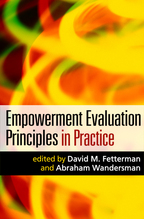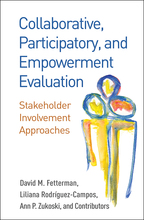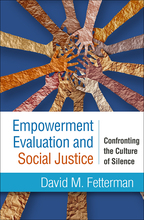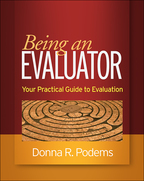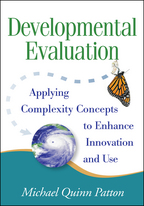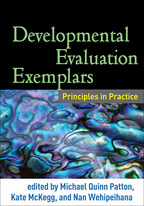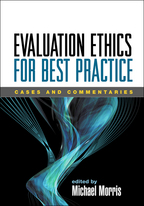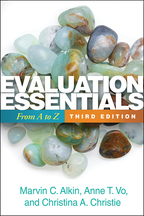Empowerment Evaluation Principles in Practice
Edited by David M. Fetterman and Abraham Wandersman
HardcoverPaperbacke-bookprint + e-book
Hardcover
orderOctober 28, 2004
ISBN 9781593851156
Price: $96.00 231 Pages
Size: 6" x 9"
Paperback
orderOctober 29, 2004
ISBN 9781593851149
Price: $64.00231 Pages
Size: 6" x 9"
“This is an emancipating 21st-century book that provides an exciting venue for assessing outcomes of service learning. Its evidence-based conceptual model defines the role of the evaluator in concert with community enhancement and program achievement. This book is ideal for educating health care professionals and students engaged in service learning, as well as community stakeholders. It has great potential as a text for undergraduate and graduate students. I would consider this book for both professional and course use.”

—May L. Wykle, PhD, RN, FAAN, Dean and Cellar Professor of Nursing, Frances Payne Bolton School of Nursing, Case Western Reserve University
“Empowerment evaluation signals the end of the days when evaluation was done in isolation of staff members and program participants. The 'new age' of evaluation enables groups to achieve programmatic goals by putting the power in the hands of those individuals who know their programs and have a stake in seeing the programs succeed. Fetterman and Wandersman give us the principles and the tools to build stronger communities through empowerment evaluation and to develop systems that incorporate evidence-based strategies. This text is easy to use and takes the reader from an overview of classic evaluation methods to the heart of empowerment for success. Thus, graduate students, novice evaluators, and experienced professionals can easily grasp the message and understand the process provided.”

—Shirley S. Travis, PhD, APRN, FAAN, Dean, College of Nursing and Health Science, George Mason University
“Fetterman and Wandersman have made a wonderful contribution to evaluation theory and literature with this book. It's no accident that the 'in practice' part of the title is printed in red—that is the focus of this work. Beginning where the earlier text Empowerment Evaluation left off, this volume clarifies the 10 principles of empowerment evaluation and applies them to real-world settings in detailed case studies. The editors and contributors have successfully revealed the 'heart and soul' of empowerment evaluation and enthusiastically offer it as a method that can be learned and mastered by any evaluation professional or student who is willing to try.”

—Frances D. Butterfoss, PhD, Center for Pediatric Research, Eastern Virginia Medical School
“The authors' framework is clearly laid out, well illustrated, and inspiring, and the results are compelling. I've made this book required reading for myself and my staff as we work with schools around the state on a five-year program designed to support schoolwide social and emotional learning (SEL).”

—Mary Utne O'Brien, PhD, Executive Director, Collaborative for Academic, Social, and Emotional Learning (CASEL), and Research Professor, Departments of Education and Psychology, University of Illinois at Chicago
“This updating of the important concept of empowerment evaluation is ideal for those who teach and carry out human service evaluations. The editors and many of the contributing authors are pioneers in the field, and bring the ideas up to date with accessible examples that will help newcomers to the field understand and use this valuable and humanistic approach to program evaluation. In the classroom, this book will serve as a readily adaptable and applicable text.”

—Leon Ginsberg, Dean, College of Social Work, University of South Carolina
“Since its introduction by David Fetterman in 1994, empowerment evaluation has spread like wildfire across the globe. From disadvantaged schools and communities to NASA and to corporate offices in South Africa, the 10 principles of empowerment evaluation are being embraced and applied to foster self-evaluation and self-determination. What is it about empowerment evaluation that appeals so much to evaluation clients and stakeholders from all walks of life? The answer lies in this new volume, the most comprehensive, readable, and up-to-date treatment of this evaluation approach. I highly recommend this text to practicing evaluators, evaluation scholars, and instructors and students interested in learning about new evaluation theories for improving practice and learning to conduct effective empowerment evaluations.”

—Stewart I. Donaldson, Dean, School of Behavioral and Organizational Sciences, Claremont Graduate University
“This work deepens our understanding of empowerment evaluation by providing a clear set of principles together with well-constructed case examples that distinguish EE from other forms of assessment. This book is essential reading for all evaluators, especially those interested in evaluation approaches that complement and reinforce community-based, participatory practices.”

—Robert M. Goodman, Professor and Chair, Department of Behavioral and Community Health Sciences, Graduate School of Public Health, University of Pittsburgh
“This book takes the authors' previous work to the next level. It provides an excellent, tangible grounding for people new to empowerment evaluation, as well as helping experienced evaluators to reflect on and improve their current practices. Instead of focusing on feeling good, this book provides examples and tools for doing good through the empowerment evaluation process.”

—David M. Chavis, Association for the Study and Development of Community, Gaithersburg, Maryland
“Making change in the world is a complex undertaking, particularly when the aim is to change systems and communities. Such efforts deserve and need an evaluation process that can simultaneously and interactively help change agents plan, guide, and learn from the change process. Many of us have been looking for this book, with its compelling theory, its understandable and teachable process, its affirmation of participants’ knowledge and sensibilities, and its practical examples. This book is an essential resource for all who are planning and executing efforts to improve programs, systems, and communities.”

—Peter L. Benson, President, Search Institute, Minneapolis, Minnesota
“This volume not only presents the principles of empowerment evaluation, but also provides concrete examples of their efficacy in achieving outstanding outcomes. The uniqueness of this book is how empowerment and evaluation are applied as interdependent elements in the evaluation process. Numerous cases clearly demonstrate that there can be no successful evaluation of a program/organization without empowerment of all the stakeholders from the very outset in its planning and implementation, and there can be no empowerment without ongoing, inclusive relationships of mutual accountability. This is a superb presentation of the principles and practices of empowerment evaluation as a flexible process useful in most program improvement/enhancement efforts.”

—Mary Kay Kohles-Baker, Senior Research Nurse, Emory University School of Nursing; Executive Director, Atlanta Regional Health Forum
—May L. Wykle, PhD, RN, FAAN, Dean and Cellar Professor of Nursing, Frances Payne Bolton School of Nursing, Case Western Reserve University
“Empowerment evaluation signals the end of the days when evaluation was done in isolation of staff members and program participants. The 'new age' of evaluation enables groups to achieve programmatic goals by putting the power in the hands of those individuals who know their programs and have a stake in seeing the programs succeed. Fetterman and Wandersman give us the principles and the tools to build stronger communities through empowerment evaluation and to develop systems that incorporate evidence-based strategies. This text is easy to use and takes the reader from an overview of classic evaluation methods to the heart of empowerment for success. Thus, graduate students, novice evaluators, and experienced professionals can easily grasp the message and understand the process provided.”
—Shirley S. Travis, PhD, APRN, FAAN, Dean, College of Nursing and Health Science, George Mason University
“Fetterman and Wandersman have made a wonderful contribution to evaluation theory and literature with this book. It's no accident that the 'in practice' part of the title is printed in red—that is the focus of this work. Beginning where the earlier text Empowerment Evaluation left off, this volume clarifies the 10 principles of empowerment evaluation and applies them to real-world settings in detailed case studies. The editors and contributors have successfully revealed the 'heart and soul' of empowerment evaluation and enthusiastically offer it as a method that can be learned and mastered by any evaluation professional or student who is willing to try.”
—Frances D. Butterfoss, PhD, Center for Pediatric Research, Eastern Virginia Medical School
“The authors' framework is clearly laid out, well illustrated, and inspiring, and the results are compelling. I've made this book required reading for myself and my staff as we work with schools around the state on a five-year program designed to support schoolwide social and emotional learning (SEL).”
—Mary Utne O'Brien, PhD, Executive Director, Collaborative for Academic, Social, and Emotional Learning (CASEL), and Research Professor, Departments of Education and Psychology, University of Illinois at Chicago
“This updating of the important concept of empowerment evaluation is ideal for those who teach and carry out human service evaluations. The editors and many of the contributing authors are pioneers in the field, and bring the ideas up to date with accessible examples that will help newcomers to the field understand and use this valuable and humanistic approach to program evaluation. In the classroom, this book will serve as a readily adaptable and applicable text.”
—Leon Ginsberg, Dean, College of Social Work, University of South Carolina
“Since its introduction by David Fetterman in 1994, empowerment evaluation has spread like wildfire across the globe. From disadvantaged schools and communities to NASA and to corporate offices in South Africa, the 10 principles of empowerment evaluation are being embraced and applied to foster self-evaluation and self-determination. What is it about empowerment evaluation that appeals so much to evaluation clients and stakeholders from all walks of life? The answer lies in this new volume, the most comprehensive, readable, and up-to-date treatment of this evaluation approach. I highly recommend this text to practicing evaluators, evaluation scholars, and instructors and students interested in learning about new evaluation theories for improving practice and learning to conduct effective empowerment evaluations.”
—Stewart I. Donaldson, Dean, School of Behavioral and Organizational Sciences, Claremont Graduate University
“This work deepens our understanding of empowerment evaluation by providing a clear set of principles together with well-constructed case examples that distinguish EE from other forms of assessment. This book is essential reading for all evaluators, especially those interested in evaluation approaches that complement and reinforce community-based, participatory practices.”
—Robert M. Goodman, Professor and Chair, Department of Behavioral and Community Health Sciences, Graduate School of Public Health, University of Pittsburgh
“This book takes the authors' previous work to the next level. It provides an excellent, tangible grounding for people new to empowerment evaluation, as well as helping experienced evaluators to reflect on and improve their current practices. Instead of focusing on feeling good, this book provides examples and tools for doing good through the empowerment evaluation process.”
—David M. Chavis, Association for the Study and Development of Community, Gaithersburg, Maryland
“Making change in the world is a complex undertaking, particularly when the aim is to change systems and communities. Such efforts deserve and need an evaluation process that can simultaneously and interactively help change agents plan, guide, and learn from the change process. Many of us have been looking for this book, with its compelling theory, its understandable and teachable process, its affirmation of participants’ knowledge and sensibilities, and its practical examples. This book is an essential resource for all who are planning and executing efforts to improve programs, systems, and communities.”
—Peter L. Benson, President, Search Institute, Minneapolis, Minnesota
“This volume not only presents the principles of empowerment evaluation, but also provides concrete examples of their efficacy in achieving outstanding outcomes. The uniqueness of this book is how empowerment and evaluation are applied as interdependent elements in the evaluation process. Numerous cases clearly demonstrate that there can be no successful evaluation of a program/organization without empowerment of all the stakeholders from the very outset in its planning and implementation, and there can be no empowerment without ongoing, inclusive relationships of mutual accountability. This is a superb presentation of the principles and practices of empowerment evaluation as a flexible process useful in most program improvement/enhancement efforts.”
—Mary Kay Kohles-Baker, Senior Research Nurse, Emory University School of Nursing; Executive Director, Atlanta Regional Health Forum

